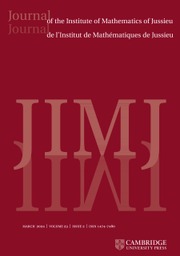Article contents
HALF NIKULIN SURFACES AND MODULI OF PRYM CURVES
Published online by Cambridge University Press: 29 November 2019
Abstract
Let  ${\mathcal{F}}_{g}^{\mathbf{N}}$ be the moduli space of polarized Nikulin surfaces
${\mathcal{F}}_{g}^{\mathbf{N}}$ be the moduli space of polarized Nikulin surfaces  $(Y,H)$ of genus
$(Y,H)$ of genus  $g$ and let
$g$ and let  ${\mathcal{P}}_{g}^{\mathbf{N}}$ be the moduli of triples
${\mathcal{P}}_{g}^{\mathbf{N}}$ be the moduli of triples  $(Y,H,C)$, with
$(Y,H,C)$, with  $C\in |H|$ a smooth curve. We study the natural map
$C\in |H|$ a smooth curve. We study the natural map  $\unicode[STIX]{x1D712}_{g}:{\mathcal{P}}_{g}^{\mathbf{N}}\rightarrow {\mathcal{R}}_{g}$, where
$\unicode[STIX]{x1D712}_{g}:{\mathcal{P}}_{g}^{\mathbf{N}}\rightarrow {\mathcal{R}}_{g}$, where  ${\mathcal{R}}_{g}$ is the moduli space of Prym curves of genus
${\mathcal{R}}_{g}$ is the moduli space of Prym curves of genus  $g$. We prove that it is generically injective on every irreducible component, with a few exceptions in low genus. This gives a complete picture of the map
$g$. We prove that it is generically injective on every irreducible component, with a few exceptions in low genus. This gives a complete picture of the map  $\unicode[STIX]{x1D712}_{g}$ and confirms some striking analogies between it and the Mukai map
$\unicode[STIX]{x1D712}_{g}$ and confirms some striking analogies between it and the Mukai map  $m_{g}:{\mathcal{P}}_{g}\rightarrow {\mathcal{M}}_{g}$ for moduli of triples
$m_{g}:{\mathcal{P}}_{g}\rightarrow {\mathcal{M}}_{g}$ for moduli of triples  $(Y,H,C)$, where
$(Y,H,C)$, where  $(Y,H)$ is any genus
$(Y,H)$ is any genus  $g$ polarized
$g$ polarized  $K3$ surface. The proof is by degeneration to boundary points of a partial compactification of
$K3$ surface. The proof is by degeneration to boundary points of a partial compactification of  ${\mathcal{F}}_{g}^{\mathbf{N}}$. These represent the union of two surfaces with four even nodes and effective anticanonical class, which we call half Nikulin surfaces. The use of this degeneration is new with respect to previous techniques.
${\mathcal{F}}_{g}^{\mathbf{N}}$. These represent the union of two surfaces with four even nodes and effective anticanonical class, which we call half Nikulin surfaces. The use of this degeneration is new with respect to previous techniques.
MSC classification
Information
- Type
- Research Article
- Information
- Journal of the Institute of Mathematics of Jussieu , Volume 20 , Issue 5 , September 2021 , pp. 1547 - 1584
- Copyright
- © Cambridge University Press 2019
References
- 3
- Cited by


